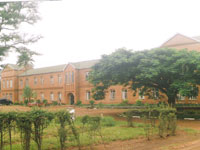VACANCIES IN THE CCAP BLANTYRE SYNOD EDUCATION DEPARTMENT
CCAP
Blantyre Synod in partnership with Save the Children International is
implementing a two year project to promote girls education under the Keeping
Girls in School (KGIS) programme with funding from UKAid from the UK
Government. The programme aims at improving
the school experience
and environment for
adolescent
girls in programme areas and will work very closely with the
Ministry of Education, Science and Technology, Ministry of Gender, Children,
and Social Welfare, as well as agencies implementing the other strands of the
KGIS programme.
Click here to read more.
Click here to read more.
The Main Mission Schools
The main mission secondary schools are: HHI, Neno School for Girls and Domasi Secondary

